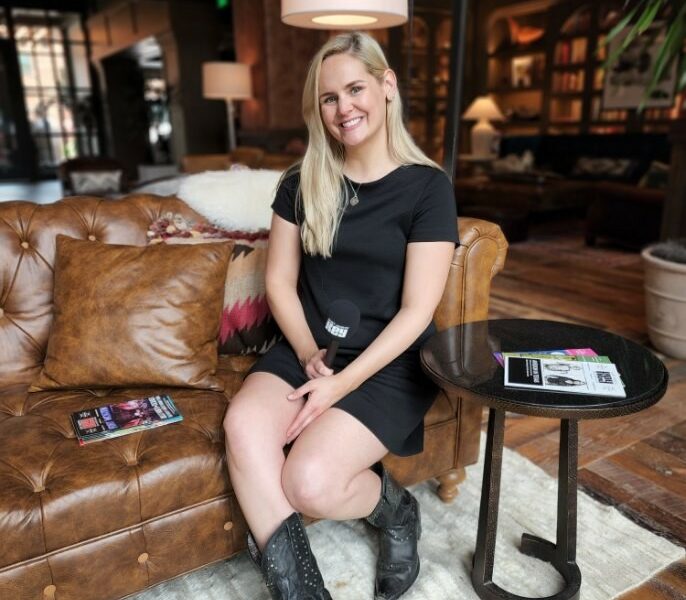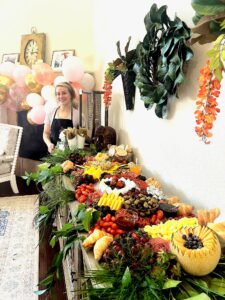
Bailey Powell Aldrich holds an MFA in Creative Writing, Nonfiction, from The New School, inspired by her grandmother Foncell Powell, journalist and editor emeritus of Fort Worth Key. Before her writing career, Aldrich spent ten years in New York City working in high fashion and photography and 18 months working for Special Olympics International in Washington, DC, an experience that’s become central to her personal ethics. A seventh generation Texan, Aldrich returned home to her roots in 2022 to work alongside her father, Keith, artist and now Fort Worth Key owner and publisher emeritus, and take over the family business. She currently lives in Arlington with her husband Rick and Great Pyrenees Pooh Bear. I’m happy that Bailey Aldrich decided to come on to the platform and share her story.
Hello Bailey, so what is Fort Worth Key?
The magazine was originally founded by Amon G. Carter in 1936 as a part of his competitive response to Dallas programming during the Texas centennial. Back then it was called the Fort Worther, but changed to Fort Worth Key in 1967. Print was king back then. However, things are gearing towards a more digital presence, so it’s one of those things where if I would like Fort Worth Key to succeed I have to pivot. I just took over from my father, Keith Powell, after he operated it for 28 years.
Do you operate in a small team currently?
It’s definitely a small, close knit team because it’s me and my dad, but the training wheels aren’t really off. He’s passing it down to me, but he’s been enjoying working with me and teaching me the ropes of his livelihood all the way back to when I was a child. There are a lot of people who prefer the tactility of paper, holding something in their hands, putting something in their bag. We do get tired of looking at our screens, our eyes get tired. Marketing Sherpa did a study about how advertising in print actually sticks with readers longer than digital ads online. I think that, ideally, we could have an equal presence in print and digital for Key.
What is the magazine structure like?
It’s a 32-page, digest size magazine. We distribute magazines to over 100 locations. A big part of that is hotels, but we also distribute to visitor centers, restaurants, shops, and other sites. There are a lot of folks who still like to use a physical map and when somebody walks off with our map, they’re walking off with our advertisers in hand too, which is a good model. In terms of the makeup of the magazine, ideally it’s 60% advertising and 40% content, so it’s free. It’s free to anybody. We give it to the hotels for free and they hand it out for free.
How time consuming is the writing process and what months are popular?
The most time-consuming part and what I would say is a hallmark of Key is putting together a curated calendar every month. We want to have a wide breadth of events for people to choose from, whether they’re looking for something free to do or something family friendly or food-related. I maintain an even more robust calendar presence on our website. March is always bananas in a good way for the travel economy because a lot of folks are on spring break and it’s spring in Texas. People are still in town in March because kids are still in school. I would say the hardest month is August because it is just dreadful. People want to stay inside of their refrigerators and it’s just so hot outside. That gives me an opportunity to really find a lot of fun things to do that are indoors or water-based. It’s just a matter of creativity, but also for anybody looking to do something fun, too. Like, this August, people could go to Rockin’ the River at Panther Island Pavilion where you’re watching a concert from your innertube on the Trinity. The Gaylord Texan has a great waterpark on site, Backwoods Paddlesports has paddleboard and kayak rentals, and of course there’s Hurricane Harbor in Arlington. There’s also a lot of great music, theater, and museum programming, all inside. Just some ideas on how to keep cool in August and get out of the house!
Do you cater to people locally and new to the area?
I’m really glad you asked me that because historically Key has been tailored toward travelers and visitors to the area. I found that there are some fabulous events going on that locals simply don’t know about. It’s good information to have. People who live somewhere want to do fun things, too. You don’t just want to do fun things or try out new restaurants whenever you’re in a new place or visiting somewhere that’s not your home. We’re embracing the concept of being a tourist in your own city. I’m definitely not in any way abandoning the people who are traveling, but I do think that that is an opportunity for people who live in Fort Worth, Arlington, and Grapevine, which are the three cities we cater to.
Did you grow up with access to this information?
I remember being a kid and going to Key magazine conferences. I would go with my parents and one year we went to California. This was pre-common use of email and pre-Zoom, so people needed to meet up physically in person, and was just a different ballgame. I do have really cool memories of that and the organization has been embedded in my family for 30 years, and my grandparents worked on it.
Would expanding into new areas be of interest to the organization?
That’s interesting because I’m a 7th generation Texan, and so Texas is very important to me. Despite spending the last ten years in New York, I’m back. This is something that we’ve thought of in a very almost abstract way. We’re trying to pivot Fort Worth Key to make it something that’s competitive and sustainable in the digital realm, but it’s just me and my dad, so it’s not like we have this fabulous operation filled with Gen-Z young people who are running the show. I think ideally if we could find someone like us in the cities we wanted to expand to… I say “like us” meaning people who were born and raised there and love that city that aren’t just, like, a corporate transplant. I think that’s kind of an issue with a lot of these, because subsidiaries of big companies break out into cities because they’ve experienced success, but it’s almost not as authentic.
Do you think it would be different if you were writing in a different city like New York?
I think there are pros and cons either way. If you’re in a smaller area, you have a larger impact. In New York, there are tons of people which create tons of opportunity for leadership, but there are also a million businesses.
Were there any surprises to working with your dad?
My dad has a degree in graphic design and illustration from the 70s. He’s like, the guy who was painting artwork for people freelance, the local starving artist. So many things have ventured onto computers, which he’s actually done an amazing job keeping up with. He’s an InDesign/Photoshop wizard, but he still does some things that are really retro. We have a laugh about how his financial books are on this piece of notebook paper that’s floating around his office whereas I’m in QuickBooks, properly numbering invoices. My dad is one of the wisest people I know and he is just very gentle and kind and patient and where I might tease him for how he did something, he doesn’t tease me back.

